|
|
|
Sort Order |
|
|
|
Items / Page
|
|
|
|
|
|
|
| Srl | Item |
| 1 |
ID:
119548


|
|
|
| 2 |
ID:
122837
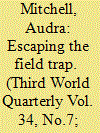

|
|
|
|
|
| Publication |
2013.
|
| Summary/Abstract |
There is a growing global demand for Northern universities to provide fieldwork opportunities in 'conflict zones' to students in applied International Relations (peace and conflict studies, post-conflict studies, human rights, development and related fields). This demand is generated in macro-level or structural dynamics emerging from three sources: the hiring criteria of major international organisations, competition between universities for fee-paying students and the social commodification of 'authentic' or 'real' life experience. At the micro level these dynamics can manifest themselves in exploitative relations, two of which are explored here. First, substantial inequalities (or a 'benefit gap') may arise between student researchers and their research subjects. Second, student researchers may find themselves in extractive relations with their research subjects. These dynamics lead to a situation in which some of the world's most vulnerable people are objectified as learning resources for students enrolled in (predominantly Northern) universities. The article argues that these dynamics are a problem of global politics, not just research ethics or pedagogy. It concludes with recommendations for reducing the potential for exploitation in educational fieldwork.
|
|
|
|
|
|
|
|
|
|
|
|
|
|
|
|
| 3 |
ID:
089333
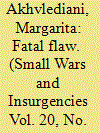

|
|
|
|
|
| Publication |
2009.
|
| Summary/Abstract |
This paper examines the role of the media during and after the August invasion of Georgia by Russian troops. It shows how on both sides the media responded to strong pressures to report the conflict from a very one-sided perspective. Indeed the conflict can be seen as a media as much as a military conflict as both sides struggled to present themselves in the best possible light before the international community and to exaggerate the losses that had been inflicted on their own rather then their enemy's forces. The article details the way this conflict was played out in printed media and TV as well as Internet blogs and provides information on the cyber war, which also broke out between the rival states.
|
|
|
|
|
|
|
|
|
|
|
|
|
|
|
|
| 4 |
ID:
134108
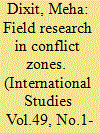

|
|
|
|
|
| Publication |
2012.
|
| Summary/Abstract |
This paper focuses on conducting research in conflict or post-conflict areas and dilemmas faced by researchers when visiting these places. It outlines some of the practical, methodological, normative and ethical issues that may engulf a researcher's mind prior to or while visiting these areas. These include access to the conflict zone, the insider/outsider debate, the feasibility of interviewing civilians and armed combatants, informed consent of the locals, the importance of the socio-cultural context, distinction between victims and perpetrators of violence, assessing trauma in conflict and post-conflict zones, and expectations of the locals. The attempt to highlight these issues does not imply that these are the only questions of concern while conducting research in conflict or post-conflict zones. However, these issues relate to the experiences of the author while travelling to such areas.
|
|
|
|
|
|
|
|
|
|
|
|
|
|
|
|
| 5 |
ID:
178984


|
|
|
|
|
| Summary/Abstract |
Armed conflict creates a context of high uncertainty and risk, where accurate and verifiable information is extremely difficult to find. This is a prime environment for unverified information—rumors—to spread. Meanwhile, there is insufficient understanding of exactly how rumor transmission occurs within conflict zones. I address this with an examination of the mechanisms through which people evaluate new information. Building on findings from research on motivated reasoning, I argue that elite-driven narrative contests—competitions between elites to define how civilians should understand conflict—increase the difficulty of distinguishing fact from fiction. Civilians respond by attempting thorough evaluations of new information that they hope will allow them to distinguish evidence from narratives. These evaluations tend to involve some combination of self-evaluation, evaluation of the source, and collective sense-making. I examine this argument using over 200 interviews with Syrian refugees conducted in Jordan and Turkey. My findings indicate that people are usually unable to effectively distinguish evidence from narratives, so narrative contests are powerful drivers of rumor evaluation. Still, civilian mechanisms of rumor evaluation do constrain what propaganda elites can spread. These findings contribute to research on civil war, narrative formation, and information diffusion.
|
|
|
|
|
|
|
|
|
|
|
|
|
|
|
|
| 6 |
ID:
162255


|
|
|
|
|
| Summary/Abstract |
Scholars of conflict often rely on fieldwork to study behaviours of civilians and combatants on the ground. A list experiment is a potentially useful tool for conflict scholars, as this survey methodology is designed to indirectly obtain truthful self-reports of behaviours while preserving the respondents’ anonymity. Acknowledging its advantages, this article also reviews the often overlooked shortcomings of list experiments as a survey method in conflict zones, including those limitations that cannot be corrected with better design or implementation. As an illustration, we discuss the list experiment employed to measure civilian assistance to the insurgents in the Donbas War.
|
|
|
|
|
|
|
|
|
|
|
|
|
|
|
|
| 7 |
ID:
157361


|
|
|
|
|
| Summary/Abstract |
Rumors run rife in areas affected by political instability and conflict. Their adoption plays a key role in igniting many forms of violence, including riots, ethnic conflict, genocide, and war. While unverified at the time of transmission, some rumors are widely treated as truth, while others are dismissed as implausible or false. What factors lead individuals to embrace rumors and other forms of unverified information? This article presents a new theoretical framework for understanding individual receptivity to rumors and tests it using original survey data gathered in insurgency-affected areas of Thailand and the Philippines. We find wide variation in rumor adoption, and argue that three factors drive individuals to embrace rumors: worldview, threat perception, and prior exposure. Contrary to conventional wisdom, we find no evidence that commonly cited factors—including education, income, age, and gender—determine individual receptivity to rumors. We also explore the implications of belief in rumors on conflict dynamics. We find that greater receptivity to rumors correlates with the belief that ongoing conflict is intractable. This suggests that rumors can not only help spark political violence, but also impede its resolution. Our findings shed light on the complex interaction between worldview and unverified information in shaping popular beliefs—and through them, political contention and competition—in conflict areas and beyond.
|
|
|
|
|
|
|
|
|
|
|
|
|
|
|
|
| 8 |
ID:
116128
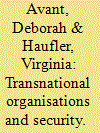

|
|
|
|
|
| Publication |
2012.
|
| Summary/Abstract |
The fields of international relations and criminology analyse security from different directions, but both have had a dominant focus on states and state agencies until recently. Even as they looked at a wider range of actors as security providers, an important category of security actors has not been analysed so far - 'non-violent' transnational organisations. Transnational non-governmental organisations (NGOs) and transnational corporations (TNCs) are not security organisations per se, but the strategies these transnational non-state actors pursue in response to violence affect security for both themselves and the societies in which they operate. We argue here that security at the local level is an outcome of interactions among diverse actors including transnational organisations and call for a research agenda focused on how transnational actors choose their response to insecurity and how those choices affect security governance.
|
|
|
|
|
|
|
|
|
|
|
|
|
|
|
|
| 9 |
ID:
132820
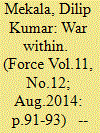

|
|
|
|
|
| Publication |
2014.
|
| Summary/Abstract |
If asked, ministry of home affairs (MHA) downplays this, but India's internal security battle is being fought by the most disgruntled, demotivated paramilitary troops. The reason for such a shameful situation is the inaction by the ministry in resolving the grievances of the forces. FORCE has interacted with many officers below Commandant rank deployed in operational positions, who claim that the weak leadership is to be blamed entirely for the situation.
MHA has often painted a rosy picture that all is well within the forces. Even in the Parliament recently, while explaining the reason behind huge number of Central Reserve Police Force (CRPF) officers quitting their jobs, the ministry stated that it is "normal and acceptable". From 2009 to 2012, in the CRPF alone 16,523 officers quit their jobs. What is more baffling is the casual tone of reasoning that the ministry has provided in justifying this issue. "The causative factors in most of the cases were mainly found to be various personal and domestic reasons… Some personnel seek voluntary retirement to enjoy a static life as well as pensionary benefits after completion of 20 years of regular service," said minister of state (home), Kiran Rijiju.
What MHA conveniently did not state in the reply to the Parliament is that most of the officers who quit their jobs were troubled by their uncertain career progression - they believed that no due credit was given for risking their lives in conflict zones. Poor salary also caused a lot of dissatisfaction. Presently, there are at least 10,000 officers from all paramilitary forces fighting various legal cases in the courts, thus proving that all's not well within.
|
|
|
|
|
|
|
|
|
|
|
|
|
|
|
|
|
|
|
|
|